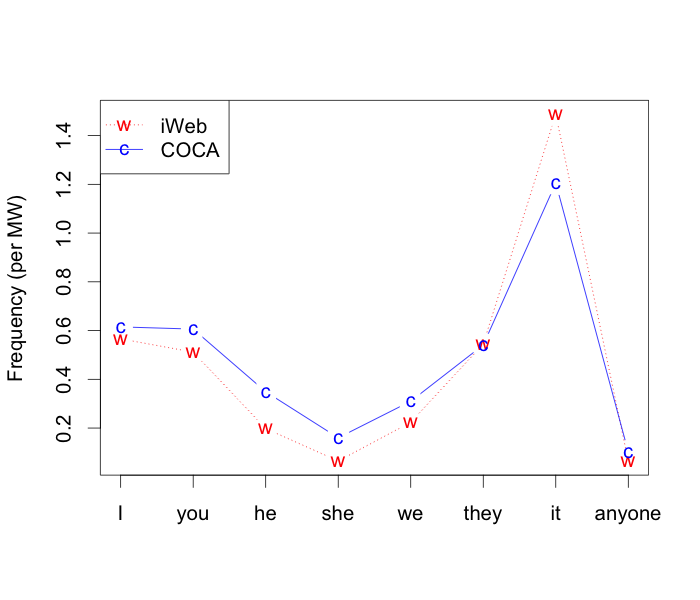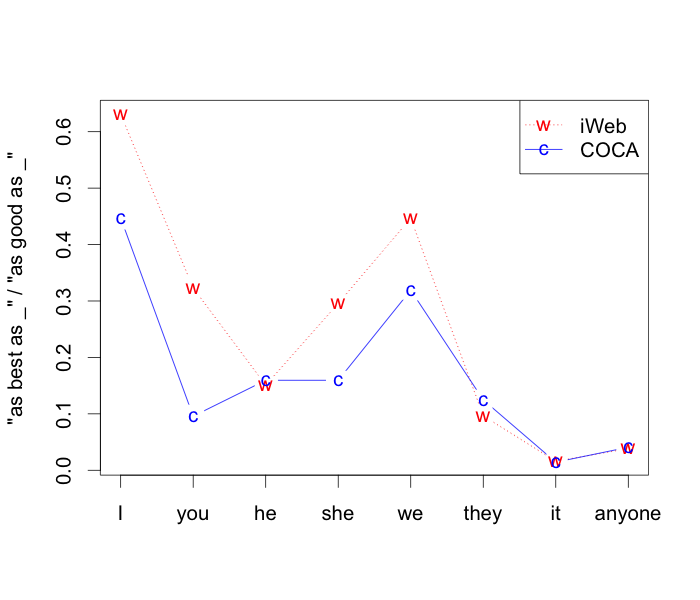"As best as we could have hoped for"
« previous post | next post »
Scott Bixby & Asawin Suebsaeng, "The Biden and Trump Shows: It’s Mr. Rogers Vs. ‘Someone’s Crazy Uncle’", The Daily Beast 10/15/2020:
“He didn’t spend the whole time yelling, he didn’t piss himself… so this was as best as we could have hoped for,” said one Trump campaign adviser.
Someone asked me about the "as best as" construction, and I was able to refer them to a 15-year-old post, "Asbestos she can", 12/29/2005.
But for today's contribution, I did a small amount of additional research, based on counts for "as best as __" and "as good as __" in two datasets, iWeb and COCA.
The most striking thing is the first-person boost in "as best as __" proportions. This is not correlated with the overall pronoun frequency in the two constructions:

The iWeb corpus is somewhat more informal (and maybe a little more recent) than COCA, which probably explains its overall greater proportion of "as best as __".

John said,
October 16, 2020 @ 12:49 pm
Be best.
Ethan said,
October 16, 2020 @ 1:31 pm
Could this be spill-over from "hope for the best"? As in (jocular) "They told me to hope for the best and it came out as best as I could have hoped for".
DaveK said,
October 16, 2020 @ 4:22 pm
@Ethan:
It sounds to me like a conflation of “this was as good as we could have hoped for” and “this was the best we could have hoped for”.
(That is, in theory it could have been better, but it would have been unrealistic to even hope for better than this”.)’
[(myl) Whatever the source, "as best as __" seems to have become a standard and widely-accepted English construction — "as best as I" is actually more common than "the best that I" in the iWeb corpus, and nearly as common in COCA. ]
Interesting that “we couldn’t have hoped for better” has the same literal meaning but is used with an opposite connotation
Bloix said,
October 16, 2020 @ 6:13 pm
The problem is that nothing can be as good as the best.
Note that the meanings of "as good as" and "the best that" are different. "As good as" means that the actual outcome may not be the same as the hoped-for outcome, but it is as good. "The best that" means that the actual outcome IS the best outcome that could have been hoped for (the "could" in that phrase implies realistic hopes).
As the coach hoped, Jack won the race and so he'll go to the finals. If he'd come in second, he still would have qualified, but coming in first is better – it's THE BEST that could have been [realistically] hoped for. That is why the superlative is appropriate. (Perhaps Jack himself hoped to set a school record, but the coach knew that this outcome could not realistically be hoped for.)
But "as good as" requires a comparison between two things that may or may not be different – but if they are different, they are equally good. Jack's teammate Jim won and Jack was second – and both will go to the finals. From the coach's point of view, this outcome is "as good as" could have been hoped for – Jim/Jack is as good as Jack/Jim.
But "as best as" just doesn't work. It's sort of intelligible, but it loses the meaningful distinction between "as good as" and "the best that."
David Marjanović said,
October 16, 2020 @ 7:25 pm
What should be compared to "as best as I" isn't "the best that I" alone, but "the best that I" and "the best I" together.
So is "as good as", if you think about it; it used to be "so good as", which is quite a bit more logical but thoroughly obsolete.
maidhc said,
October 17, 2020 @ 3:41 am
To me, "the best that" implies taking other circumstances into account: "Once we knew that Phar Lap was entered for the race, the best that we could expect was that our horse would come in second."
"As best as" seems to my ear to be related to phrases like "As best as I can figure, we must be somewhere sou'west of Pitcairn Island." I suppose that's not really standard English, but it's been in use for some time. Would "As best I can figure…" be more acceptable? I can see that the second "as" could have been added for dramatic effect.
Cervantes said,
October 17, 2020 @ 6:47 am
It's stylistically inelegant, certainly. I'm not sure if it's grammatically incorrect or just a pleonasm. "The best we could" or "As best we could" say it with one less word, and get my editorial OK.
Ralph Hickok said,
October 17, 2020 @ 8:06 am
I'm with Cervantes here. I've heard the "As best" construction without the second "as" all my life and never even thought about it. But "as best as" sounds really weird to me; I can't say I've ever heard or seen it before.
Robert Coren said,
October 17, 2020 @ 9:49 am
i wonder if a numeric comparison between uses of as best as and as good as is somewhat confounded by the fact that in some cases one would be as likely or more likely to say as well as instead of the latter.
Bob Ladd said,
October 17, 2020 @ 11:19 am
I agree with Cervantes and Ralph Hickok. To me, this is just a reanalysis of the long-standing construction in "As best we could" (see the 2005 LgLog post that MYL links to). The fact that it can get reanalysed to "As best as we could" provides a nice example of how suppletive or irregular forms (in this case, "best") can often wriggle their way into expressions where they don't really fit grammatically. (Classic example is the use of irregular plurals in compounds like "teeth whitening" alongside "tooth whitening" – nobody would say "nails polish" instead of "nail polish", but "teeth" instead of "tooth" is not so conspicuous.) That is, nobody would think of saying "as fastest as we could", where is grammatically anomalous superlative form sticks out in a way that "best" doesn't.
Coby said,
October 17, 2020 @ 2:12 pm
I wonder if this any worse than the very common "the least worst", which really means simply "the least bad".
Andrew Usher said,
October 17, 2020 @ 5:15 pm
I don't think it makes any more or less sense without the second 'as', and I have no intuition myself about whether it should be included. As noted by Bob Ladd no other superlative can be used in that context – is it likely that originally 'as best I can' was a blend of 'the best I can' and 'as well as I can' or similar?
In that case, the addition of the second 'as' would just be regularising it to the form it perhaps should have had to begin with; for no other adjective it is standard to omit it.
k_over_hbarc at yahoo dot com
Rodger C said,
October 18, 2020 @ 9:07 am
I'd supposed that "as best I can" is just fossilized early Modern English syntax for "as I can best do it."
Graeme said,
October 21, 2020 @ 8:28 am
When you get caught between the moon and New York City…